We at the Global Healthy Living Foundation (GHLF) learn from our patient community every day. During this Black History Month, we’re listening and learning as many of our members are discussing racial injustice and health disparities among Black patients with chronic illness, from rheumatic conditions to migraine to heart disease and more.
After enduring painful health journeys — including staggering lags in diagnosis and poor quality of treatment and other aspects of care — these advocates are “amplifying Black patient voices to help spark important conversations and show others within Black patient communities that they’re not alone,” says Sarah Reneé Shaw, BIPOC Patient Advocate, Community Outreach Manager at the Global Healthy Living Foundation.
“It’s our role as an organization with a platform to pass the mic and amplify all the hard work that underserved communities are doing on the ground — year-round, not just during the month of February,” says Sarah, who has chronic migraine.
Below you can meet (and follow) just a few of the many Black patient advocates who are dedicating their lives to improving health care for marginalized patients.
Follow GHLF and our arthritis patient community CreakyJoints on Twitter, using the hashtags #BlackHistoryMonth, #BlackChronicPain, and/or #DisabledBlackTalk, to meet others and share your story. If you’re interested in getting involved, you can also email Sarah here.
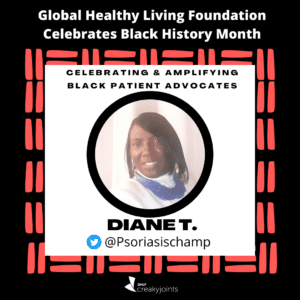
Diane Talbert: “I have a voice and I need to use it”
Diane, who has psoriasis, psoriatic arthritis, diabetes, and high cholesterol, says she’s been a prisoner in her own body for 30 years. “I had an invisible illness that no one understood, and my doctors told me it was all in my head. I was young, always smiling, and showed self-confidence on the outside. But on the inside, I was having unbearable pain.” Years later, her psychologist helped her realize that she was smiling on the outside and crying on the inside.
“One day someone told me I had a voice and I needed to use it. My first advocacy work ever was starting a support group in my area. It took off well beyond [what I could have imagined]; I had organizations that stepped in to help me with drinks, snacks, venues, speakers, and food. This was my beginning. I knew my community and understood what they wanted and what they were going through.
Yes, I did have a voice, but I had to find that voice. I knew I wanted to speak on behalf of people who could not speak for themselves. I wanted to advocate for the rights of people with pain and have the courage to speak up about it. How did I get to where I am now at this moment? It was not by accident. I really had to educate myself not only on my own diseases but on issues surrounding the treatment of pain as well.”
Why I Advocate
As I look back over the past 60-odd years of my life, I could write a book. I remember a doctor telling me to add Vaseline to my medication so it would last the whole month. I had a doctor tell me that ‘this is the best I can do for you,’ when I was 70 to 80 percent covered in [psoriasis] scales. Trust me, if I had not grown up on the wrong side of the tracks as a Black woman, I don’t think I would have suffered so much in my life. I also believe that because I didn’t have insurance at times, or low-quality insurance, it took longer for me to get a proper diagnosis. We need to talk more about disparities in health care. This is the 21st century and we are going through the same things I experienced in the 1960s and 1970s.
We need more Black patient advocates. People need to realize that our lives matter, too, and we deserve a diagnosis. There is limited research in our communities, which is most likely caused by genetics, lifestyle, and cultural factors.”
Diane is the founder of Power Beyond Psoriasis. Follow her on Twitter @Psoriasischamp and Facebook. She also runs a private Facebook support group. Listen to “Diane’s Story: It’s Never Too Late to Start Getting Good Care.”
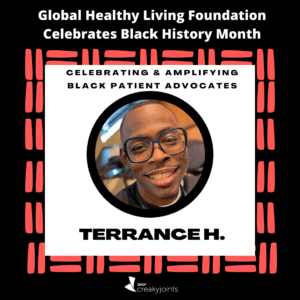
Terrance Hill: “I will continue to spark the flame of our lost warriors”
Terrance is a sickle cell warrior and advocate who lives with complications related to sickle cell disease. After battling sickle cell disease his whole life, Terrance received a successful stem cell transplant in 2016, which leaves him with just the genetic trait. “I got the half cure,” he explains, which means he is not completely sickle cell-free.
Why I Advocate
“Illness has not stopped me from wanting to better myself to serve my community of sickle cell warriors during this pandemic. With the widespread of the coronavirus and knowing those who have succumbed to it, I realize getting my education would be valuable for me so I can help others. Taking classes online allows me to stay safe while pursuing my master’s degree [focused on mental health with an emphasis in Christian ministry]. I am looking forward to implementing my educational fundamentals with my ongoing advocacy work within the sickle cell community.
I want to be an example to the sickle cell community — to show what you can accomplish while spending time in isolation with a chronic illness. I am determined to succeed. Failure is not an option. By embracing the goals of our lost warriors who strive to advocate for those afflicted with rare diseases, I will continue to spark the flame they have ignited, for they are deeply missed but never forgotten.”
Terrance sits on the GHLF COVID-19 Patient Leadership Council. He is a member of the Sickle Cell Disease Association of Illinois, an Illinois Ambassador at Sick Cells, an SCD & Trait Support Group who holds their meetings virtually on Zoom.
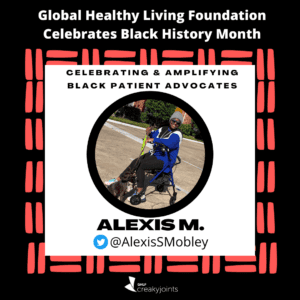
Alexis Mobley: “We will get our standing ovation at the end”
Alexis had already been diagnosed with chronic migraine, moderate to severe depression/anxiety, and premenstrual dysphoric disorder when she was also diagnosed with rheumatoid arthritis in December 2020. This was after months of trying to get to the bottom of unexplained pain and after years of getting used to having debilitating chronic conditions. “As I was searching for support during the pandemic and losing mobility and independence because of my [at the time] undiagnosed rheumatoid arthritis, I realized that I was disabled too and couldn’t sit back and let injustices that my community face continue to occur,” says Alexis.
She is in her final semester as a PhD candidate in neuroscience and immunology at The University of Texas MD Anderson Cancer Center UTHealth Graduate School of Biomedical Sciences.
Why I Advocate
“I brought myself into advocacy work to reclaim my power and spread it to other people who need it. At the beginning of the pandemic, as my RA started to present for the first time, I needed a community to figure out the tricks of the trade just to survive.
After the brutal murder of George Floyd, I decided that I had to act too. I couldn’t depend on others to handle my fight and figured out how I could fit in the ecosystem of advocacy. I used my resources to continue to advocate for the marginalized, as I’m a passing “non-disabled” — at least on camera — and my educational background carries a lot of weight.
We need more Black advocates, more people sharing their stories. Everyone is unique and that unique spark is what will help shape the world to be as accessible as it can be. Your story will help others know they are not alone and find their own power whether it be ambulating at home or enjoying parts of their life they never thought they’d get back.
I like to use a choir analogy because advocacy can be hard. In a choir, we all have our parts. Some people are singers, some people conduct or perform the accompaniment, and others are in the shadows making sure the lighting, transitions, and microphones are all working. No matter where you fall, even as a member of the audience, you have a role. You have contributed in some way and advanced the mission: a successful performance.
So, get in where you fit in. Join the group. Join the community. You don’t have to do it all. It’s okay to rest. We will get our standing ovation at the end. When the work is done.”
Alexis is the President, Treasurer, and Co-founder of Black in Immuno, a nonprofit organization that aims to amplify, celebrate, and support Black voices in immunology, and the Co-founder of the organization Black and Disabled in Higher Education. Follow her on Twitter @AlexisSMobley and soon on TikTok @adventuresofabi3. Read “As a Single Mom with Newly Diagnosed Rheumatoid Arthritis, I’m ‘Elated and Nervous’ for My Child to Get the COVID-19 Vaccine.”
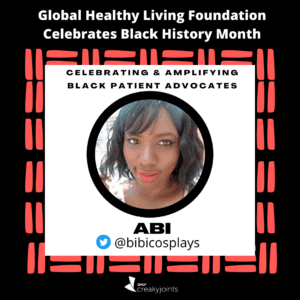

Abi: “Education can change people’s minds”
Abi, who lives with more than 12 chronic illnesses, including fibromyalgia, chronic fatigue syndrome, chronic migraine, osteoarthritis, depression, and anxiety, worked as a software developer for many years before their health interfered.
Currently, they run Bibipins, a website that sells jewelry, enamel pins, candles, horns, coasters, plant pots, charms, and stickers for people with disabilities. “I’m an outspoken Black disabled queer non-binary person who loves anime, gaming, cosplay, and helping people,” Abi says.
Why I Advocate
“I didn’t really have a choice but to be an advocate. If I didn’t speak up for myself during my daily life, no one else was going to. I started to speak up more because I didn’t want others to go through what I’ve been through. I wanted people to feel seen. I want them to know that they’re not alone. I think it’s important to share your voice and experience to create visibility. I believe that education can change some people’s minds — and help make society better.”
Follow Abi on Twitter @bibicosplays.
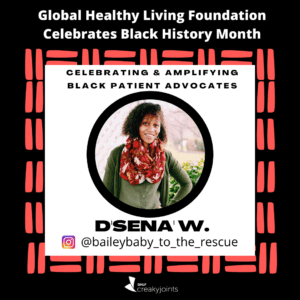
D’Sena’ Warren: “I’m worthy of the care I deserve”
D’Sena’ is a single mom with two young boys. She has been living with migraine since age 9 and also has dysautonomia and hypermobile type Ehlers-Danlos syndrome (hEDS). After suffering a traumatic brain injury after a motor vehicle accident in 2010, D’Sena’ was diagnosed with chronic migraine and then complex migraine.
Why I Advocate
Her advocacy work on social media began shortly after getting a service dog three years ago. “Once becoming one with the community, I noticed there weren’t many people of color that could quite relate to my treatment as a woman of color,” she says.
“I found my voice as I was trying to navigate through a system that is constantly trying to push me off as someone not worthy of the care I deserve. I ran with it and never looked back. Since then, I’ve enjoyed sharing my experience as a woman of color with the care/lack of care I’ve received. My life as a patient, mom, and advocate for not just myself but my community. As well as the youngest of my two sons who also lives with this disease.”
Follow D’Sena’ on Instagram @baileybaby_to_the_rescue.
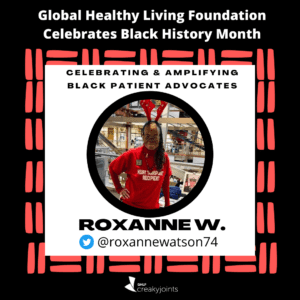
Roxanne Watson: “I vowed to correct the disparities”
Roxanne, proud mom and full-time advocate for organ donation and heart health, received the gift of life in the form of a new heart on July 16, 2010. She was on the waitlist for two years.
Why I Advocate
“While waiting for my heart, I learned that minority transplant candidates were the majority of those waiting but not the majority registered,” she says. “I vowed that if I survived the transplant, I would work on advocacy to correct the disparities.”
Roxanne began working around the Bronx and throughout New York. She now volunteers for several local and national organizations, including Live On NY, WomenHeart, and American Heart Association.
Follow Roxanne on Twitter @roxannewatson74 and on WRCR Radio 1700am NY/ WRCR.com livestream Wednesday mornings 9:15 to 10 a.m. EST. Roxanne also serves on the GHLF COVID-19 Patient Leadership Council.
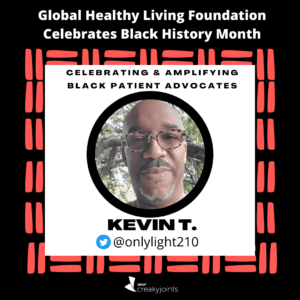
Kevin Thomas: “Share your voice, help a life”
Kevin, who lives with ankylosing spondylitis, vestibular migraines, and Meniere’s disease, worked as Head of Retail and Visitor Services at Briscoe Western Art Museum in San Antonio before stepping away to focus on his mental and physical health.
Why I Advocate
“Early in my journey to an AS diagnosis, I learned quickly I would have to be my own advocate with physicians and medical practitioners. Unfortunately, when the disease is diagnosed in African Americans the diagnosis arrives late if it all. Reports show Black Americans with AS experience much more complicated damage and outcomes. Migraines too are seen diagnosed more often in white women, over African Americans or men in general, which is why patient advocacy is important. The voice of Black people as patient advocates is necessary in rheumatic, neurologic, and vestibular disorders.
Without our voices, Black patients become invisible, underdiagnosed, and experience poor health outcomes. Advocacy can take the form of sharing information about our symptoms, diagnosis, treatments, and journey on social media platforms, in in-person and online support groups, blog posts, sharing with our immediate family and friends, and supporting the various organizations that support and advocate for us. I’m personally still dealing with the deep parts of my illnesses, but I do my best to advocate by sharing my challenges. Share your voice, help a life.”
Follow Kevin on TikTok @growthemind210 and Twitter @onlylight210. Read “Kevin’s Ankylosing Spondylitis Story: My Life’s Not Over, It’s Changed.”
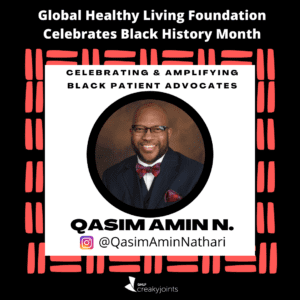
Qasim Amin Nathari: “I have an obligation to be a voice for the voiceless”
Qasim, who has lived with migraine for more than two decades, is an author, community servant, communications, media strategist — and “most importantly, a father and grandfather.” Having worked in municipal government serving as a deputy communications director for a mayor (and now U.S. Senator), Qasim has experienced the reality of having a career impacted and ultimately derailed by migraine.
Why I Advocate
“I am determined to use my own experience and journey with migraine to add value and more substance to the conversation around migraine in the BIPOC community, especially when it comes to what I feel is the most overlooked member of that community when it comes to migraine diagnosis and treatment: the Black man.
After seeing an amazing, powerful Black woman migraine advocate — Jaime Sanders, The Migraine Diva, on a segment of Good Morning America in early 2020 — and subsequently connecting with and being interviewed by her, I was guided to this path. She introduced me to the broader migraine community and opened doors for me. I have since been able to meet and engage with some amazing people — doctors, patients, advocates and others, across a wide spectrum of races/ethnicities and genders.
While participating in several forums, panel discussions, and other conversations, I became even more convinced that as a Black man in America with migraine, I have an obligation to be a voice for the most oftentimes voiceless and marginalized. In every discussion that I have been involved in since 2020, aside from a few Black doctors, I have been the only Black man there. This is a microcosm of the larger challenge around diagnosis and treatment. Enough said.”
Qasim has participated in various panels, including Allergen Meeting of the MINDs, DiHAC Conversation for CHAMP, and the Talking Head Pain podcast. He is involved in Black Men Have Migraine Too, a new initiative focused on migraine awareness and advocacy for Black men and the challenge and impact of disparities in diagnosis and treatment. Follow Qasim on Instagram @BlackMenHaveMigraineToo and @QasimAminNathari and on Twitter @BMHMToo and @aminnathari.
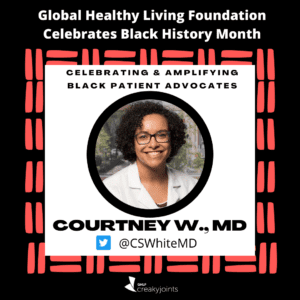
Courtney S. White, MD: “Education is key to equality and advancement”
Courtney, who lives with migraine, depression, and general anxiety disorder, is a neurologist and headache specialist in Philadelphia. As a Black woman and a member of the LGBTQ+ community, she is no stranger to intersectionality and the challenges that come from being part of multiple underserved communities. “Being both a provider and a patient, I have seen the challenges from both sides and work to decrease the barriers to treatment from various perspectives,” says Dr. White.
Why I Advocate
“Despite having a background in health care and family members with migraine, it took several years for me to fully understand my disease and advocate for myself to have an appropriate treatment. If I had this much of a challenge, I knew it would be even harder for others without access to resources. For me, advocacy is about education. I love teaching medical students, other physicians, patients, and the community in general. I believe education is the key to equality and advancement.”
Courtney has been involved with migraine advocacy since 2020, when she started working with Miles for Migraine. She currently works with the Coalition for Headache and Migraine Patients (CHAMP) and their Disparities in Headache Advisory Council (DiHAC) to help improve access to migraine education and access for underrepresented communities. You can follow Courtney @CSWhiteMD on Instagram, Twitter, and TikTok. Listen to “Please Believe Me, I Have Migraine.”
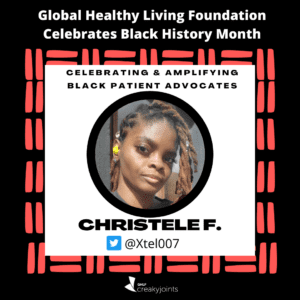
Christele Felix: “Our wants and needs matter as Black patients”
Christele, who lives with systemic lupus erythematosus (SLE), Raynaud’s disease, lupus nephritis (LN), and adrenal insufficiency, was diagnosed with lupus as a young adult, shortly after moving from Haiti to the United States. “This changed the trajectory of my life and my plans for the future,” says Christele. “I had never heard of lupus before. The idea of a life with chronic illness was inconceivable to me. Fifteen years later, I am still finding my way and trying to thrive in my own way.”
Why I Advocate
“I became an advocate almost by default when I was diagnosed, because I had to stand up for myself to receive the care I needed and to take the steps to improve my health and quality of life. I constantly speak about my experience as a patient because it’s important to normalize my experience in society and my community — and to make the medical community aware of our needs and wants. Meaningful medical advances can’t happen without us, the people they are meant to happen for. Black patients have unique experiences that must be taken into account. Our voices are necessary today and every day to ensure that innovations in health care that affect us reflect our needs and life stories.”
Christele is a member of the executive team of LupusChat, a grassroots organization dedicated to education and empowerment of people with lupus and chronic illness, as well as their families and loved ones. She is one of the hosts of #LupusChat, which takes place biweekly on Twitter on Sundays at 3 p.m. EST.
Follow Christele on Twitter @Xtel007.
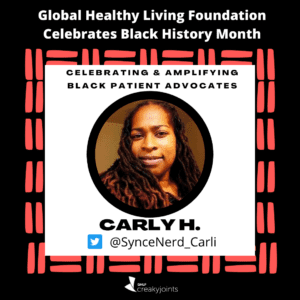
Carly Harrison: “Black patients are prominent stakeholders in the health care process”
Carly, who lives with SLE, Raynaud’s phenomenon, and long COVID, works with legislators, physicians, pharmaceutical companies, patients, community leaders, and health technology experts to improve patient care and ensure that patients, as prominent stakeholders, are present in every step of the health care process. “I find it extremely important for the people most severely impacted by an illness to be at the forefront of advocacy and research for that illness,” says Carly.
Why I Advocate
“I became an advocate a few years after my lupus diagnosis. I didn’t initially take on that role, opting instead to handle my own illness and be left alone. It wasn’t until after joining support groups and attending information sessions with other patients that I became an advocate. It’s important for Black advocates to occupy space within health care because it is paramount that our concerns are heard and properly addressed. We won’t get that without proper representation — not to be confused with tokenism, which we often see in these spaces.”
Carly is Chief Research & Innovation Officer for LupusChat, Co-host of #LupusChat, and Research Lead & Patient Board member with the COVID-19 Global Rheumatology Alliance. She sits on the NIH COVID-19 Treatment Guidelines Panel. Follow Carly on Twitter @SynceNerd_Carli and @Lupus_Chat and Instagram @Lupus_Chat.
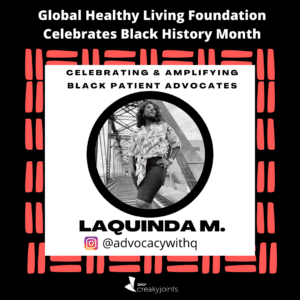
LaQuinda McCoy: “We need to advocate for inclusion”
LaQuinda has endometriosis, chronic intractable migraine disease, Sjögren’s syndrome, small fiber neuropathy, and fibromyalgia. As a migraine patient for more than 25 years, “there have been too many incidents where my health care team dismissed, rushed, and even lied to me,” LaQuinda says.
Why I Advocate
“I was frustrated with being unheard by those who swore an oath to help me. I began educating myself on my chronic disorders and sharing my story with family and friends. In 2019, I dived headfirst, advocating via social media. There are still many individuals who believe racial inequality no longer exists. Blacks have lower-quality health care compared to their counterparts and have a higher rate of chronic conditions. Our voices are grossly underrepresented, so we need to advocate for ourselves and our community for inclusion.”
LaQuinda works with a variety of organizations as a health advocate/contributor, including Wego Health, U.S. Pain Foundation, Migraine Again, and the Disparities in Headache Advisory Council (DiHAC). Follow LaQuinda on Instagram @advocacywithq.
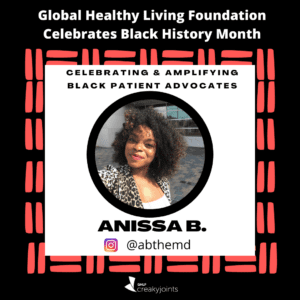
Anissa Butler: “Sharing stories is how we find our own answers and autonomy”
Anissa, who lives with migraine, chronic depression, generalized anxiety, and chronic pain from bilateral hip injuries, is a native of Jackson, Mississippi. They are currently attending medical school, where their true journey of advocacy and outreach began.
Why I Advocate
“I have always considered myself an advocate — especially for Black patients and the Black community — throughout my life. During my share of discrimination, labeling, and medical adversity, I gained a sense of and voice for advocating for myself out of necessity. A young Black woman with anxiety and depression expressing ambiguous pelvic and hip pain became an automatic dismissal as pain-seeking and conversion disorder, completely missing my actual diagnosis of labral tears in both hips. This translated into advocacy while training as I was able to contribute to conversations around care for Black people of all ages, and teach Black patients what was happening during their care to help them make well-informed decisions while maintaining autonomy. Community care and sharing stories is how we find our own answers and autonomy in seeking medical help. I’ve been able to share my story with other Black people handling health challenges, leading to connection. It’s my favorite part of being a health care provider, fellow patient, and community advocate.”
Follow Anissa on her blog (www.abthemd.com), YouTube channel, and on Twitter and Instagram @abthemd.
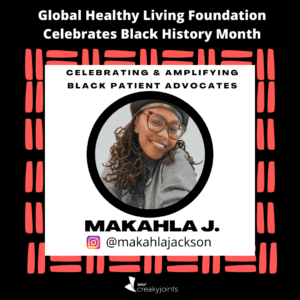
Makahla Jackson: “We have our voices to project any and all injustices”
Makahla, who lives with Ehlers Danlos and congenital lymphedema, is a disability rights activist with a passion for disability justice and racial equity. “As a Black disability advocate, I find myself having to constantly fight for representation — both in my communities and in the health care system,” says Makahla.
Why I Advocate
“Being a Black woman, my voice can become muddled within a system that still holds the misbelief that we ‘feel pain differently.’ It’s imperative that Black people know how to properly ask for proper care. Knowing how to advocate for ourselves in a medical setting is huge. We may be met with an unjust system, but we always have our voices to project any and all injustices. Our voices are crucial to research, education, as well as addressing stereotypes. I like to make my activism accessible to anyone on their healing journey.
Makahla is a writer who focuses heavily on the intersection of being Black and disabled. Follow her on Instagram @makahlajackson.
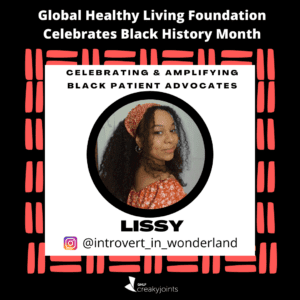
Lissy: “Sharing voices so our experiences are not erased”
Lissy, who lives with fibromyalgia, began experiencing widespread pain to a point where she could no longer work. “It took a very long time and many hospital and doctor visits to finally have one doctor say I have fibromyalgia,” says Lissy. During this time, the pandemic began and despite having a diagnosis, she did not get the medical or emotional support she needed. “I tried to carry on with life best I could, which made my pain and mental health worse.”
Why I Advocate
“I decided to go on a healing journey last year and made the decision to document it, which led to sharing the realities of being Black Caribbean British and navigating life with chronic illness. I then started to connect to others who were in a similar boat.
After reflecting on the bad experiences I had been though, I realized that I wasn’t alone and began advocating for Black people living with chronic illness. I found that there wasn’t much visibility of Black people with chronic conditions, and I wanted to raise awareness of our experiences. The intersection of chronic illness and race can make our situations very different, in how we find our way through the biased health care system to our community attitudes surrounding chronic health. I hope more Black people with chronic illness will share their voice so that our experiences are not erased and listened to.”
Follow Lissy on her website as well as on TikTok and Instagram @introvert_in_wonderland and Twitter @introvertwonder.
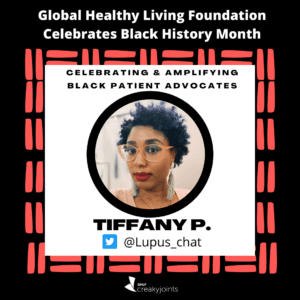
Tiffany M. Peterson: “Sharing lived experiences dispels misinformation and builds communities”
Tiffany, who lives with SLE, LN, fibromyalgia, depression, and anxiety, is a New York City-based patient advocate whose inspiration arose from her own personal battles within the health care system.
Why I Advocate
“More often than not when we look at the representation from various health and disease-related organizations rarely will we see adequate representation of the Black diaspora. So many of these chronic conditions affect Black populations at disproportionate rates but when we look at some of the media and scientific data these organizations share publicly it’s predominantly white, which is extremely disappointing. This is why it’s so important for Black people living with chronic conditions to share their lived experiences both online and offline. By doing so we can become advocates that help dispel misinformation while also building community for both ourselves and others.”
Tiffany is Chief Executive Officer of the patient-driven online community LupusChat. You can follow her on Twitter and Instagram @Lupus_Chat and on her personal Twitter @TiffanyAndLupus.
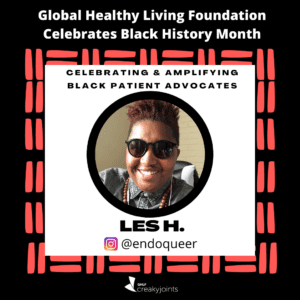
Les Henderson: “The industry needs to apply changes for the better”
Les Henderson, who lives with endometriosis, is the founder of endoQueer and host of the Be A Beacon Podcast. After surviving a spontaneous pneumothorax (lung collapse) in 2016, which was related to her endometriosis, she knew she had to get out there, tell her story, and create a space to help others.
Why I Advocate
“We all have our own experiences. And especially with health care treatment, there are definitely biases and differences that need to be discussed and listened to. The industry needs to take those issues and apply changes for the better. For our lives. Our well-being.”
Les has shared her experiences with medical journals, books, and magazines, including Vice and Cosmo UK. Follow Les on www.endoQueer.com and on Facebook, Instagram, and Twitter @endoqueer.
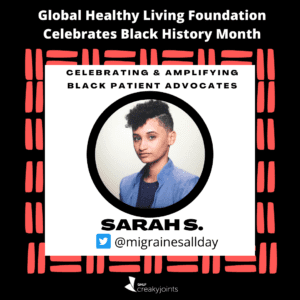
Sarah Reneé Shaw: “I advocate so one day we won’t have to”
Sarah, who lives with chronic migraine, endometriosis, anxiety, and complex post-traumatic stress disorder, was met with the harsh realities of disparities in the health care system at a very young age. “I’m a transracial adoptee [when a family adopts a child of a different race]. My father was white and an amazing advocate for my health; however, when he passed away, I noticed how little doctors listened to me, and dismissed me, compared to how they used to listen intently to my father.”
Why I Advocate
“I advocate because I frankly didn’t have a choice. My pain became so unbearable. I was constantly dismissed by doctors and given excuses that my head pain was due to an increase of stress and anxiety. I was later diagnosed with chronic migraine. I was told that my ‘periods were supposed to be that painful’ — years later, I was diagnosed with endometriosis. I advocate to let other Black advocates, BIPOC advocates, and LGBTQIA+ advocates on their health journey know that the burden does not fall solely on their shoulders and that they are not alone.
I grew up thinking that migraine disease didn’t affect Black people because, quite frankly, I had never heard or seen that represented throughout media or knew a Black person in my life with migraine. Representation 100 percent matters. I advocate as a queer Black woman so that our pain is taken seriously. So that the maternal death rate for Black women lessens. So that other Black people living in pain see themselves represented in their chronic pain/disease. So that we are represented in clinical trials. Because our pain and our lives matter. I advocate so that hopefully one day we won’t have to.”
Follow Sarah Reneé on Twitter @migrainesallday and Instagram @chronicmigrainegirl. You can also listen to her migraine story on the Talking Head Pain podcast.
Be a More Proactive Patient with ArthritisPower
ArthritisPower is a patient-led, patient-centered research registry for joint, bone, and inflammatory skin conditions. You can participate in voluntary research studies about your health conditions and use the app to track your symptoms, disease activity, and medications — and share with your doctor. Learn more and sign up here.
If you’re interested in being a patient advocate with ArthritisPower and helping our efforts to engage more diverse patient groups in research, check out our Patient Engagement Advisor Program.





